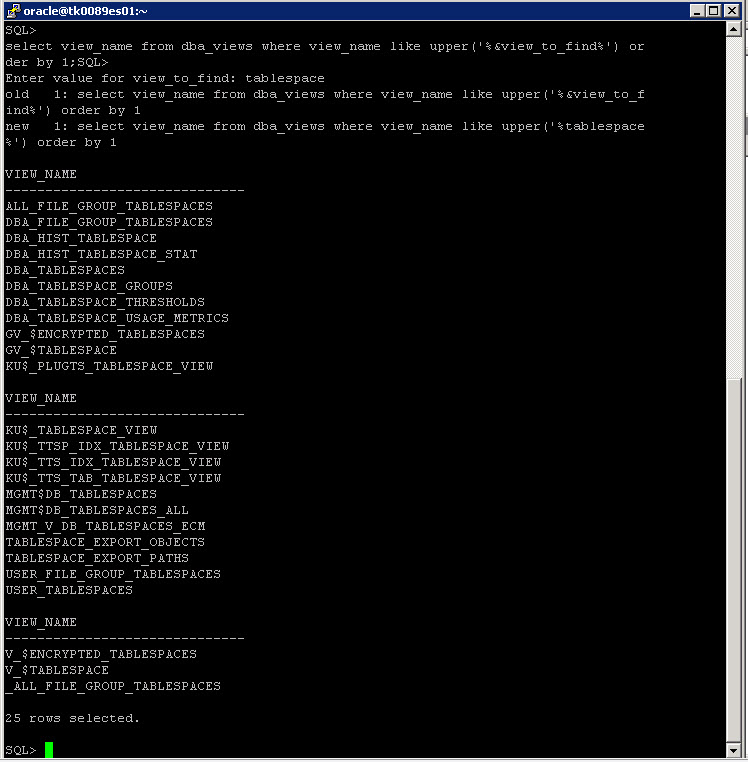Oracle Database
--
Questions
--
Followers
Top Experts
I am logged on to that database server and using Sqlplus to login as SYSTEM.
I would like to be able to view all the schemas that were created and also to be able to change the password for some of them.
could you please provide some commands on how I can do this type of DB admin tasks direclty from the sqlplus command line?
Thanks.
Zero AI Policy
We believe in human intelligence. Our moderation policy strictly prohibits the use of LLM content in our Q&A threads.
select * from dba_users;
Alter the password with
alter user schema identified by new_password;
Wmp
Or from sqlplus using this command select distinct owner from dba_objects;






EARN REWARDS FOR ASKING, ANSWERING, AND MORE.
Earn free swag for participating on the platform.
SELECT username FROM all_users ORDER BY username;
alter user <user_name> identified by <new_password>;
I have the Oracle client intalled with admin stools but i don't see Oracle Enterprise Manager. Can someone help me with access to OEM?
Thanks
OEM is now browser based as of 10g. The 9i OEM fat Java version still works against a 10g database. After that: Either dbConsole inside the database itself or Grid Control for managing multiple instances. Either way: Browser based.
>>I think that the GUI of using Oracle Enterprise Manager would be best.
Opinion. I prefer sqlplus and a simple select statement. But, that is just me. Besides, OEM doesn't offer a SQL worksheet like SQL Developer, if you like GUIs.

Get a FREE t-shirt when you ask your first question.
We believe in human intelligence. Our moderation policy strictly prohibits the use of LLM content in our Q&A threads.
This is a different question.
All the data dictionalry views are in the docs:
select tablespace_name from dba_tablespaces;
Keep this SQL handy:
select view_name from dba_views where view_name like upper('%&view_to_find%') order by 1
/
I call it: find_view.sql
When you execute it and prompted, just enter a partial word like tablespace and it will show you ALL the views that are like that term.
99% of the time a view will pop up and it will be obvious what one you need.






EARN REWARDS FOR ASKING, ANSWERING, AND MORE.
Earn free swag for participating on the platform.
With the SQL you provided: select view_name from dba_views where view_name like upper('%&view_to_find%') order by 1
Are you suggesting that I take that one line and paste it in Notepad and save it as... .SQL file? then upload it to my Oracle DB Linux server location?
If so, how would I run that script from the Linux server? Not sure how to execute sql scripts on Oracle Linux server.
I just need more detailed steps. Thanks
Save it where ever you run sqlplus from. To execute the script from sqlplus:
SQL>@find_view
by default sqplplus looks for scripts in the folder you execute sqlplus from. If you save it to another folder:
SQL> @/some/path/find_view
But I know I have tablespaces called: PRODDTAT, PRODDTAI, TESTDTAT, TESTDTAI, etc, etc.

Get a FREE t-shirt when you ask your first question.
We believe in human intelligence. Our moderation policy strictly prohibits the use of LLM content in our Q&A threads.
this will show you the view for tablespaces:
select tablespace_name from dba_tablespaces;
I already posted that exact query in http:#a37827849
The rest of the SQL was for future help in finding the correct view.
Please read all previous posts before posting.






EARN REWARDS FOR ASKING, ANSWERING, AND MORE.
Earn free swag for participating on the platform.
I was explaining to him what you put. I wasn't trying to post the same thing over again.

Get a FREE t-shirt when you ask your first question.
We believe in human intelligence. Our moderation policy strictly prohibits the use of LLM content in our Q&A threads.
As you can see the first part of the second sentence was cut off which was pointing back to your post.
Look I have been an expert for a while on EE check my credentials.
Oracle Database
--
Questions
--
Followers
Top Experts
Oracle is an object-relational database management system. It supports a large number of languages and application development frameworks. Its primary languages are SQL, PL/SQL and Java, but it also includes support for C and C++. Oracle also has its own enterprise modules and application server software.
